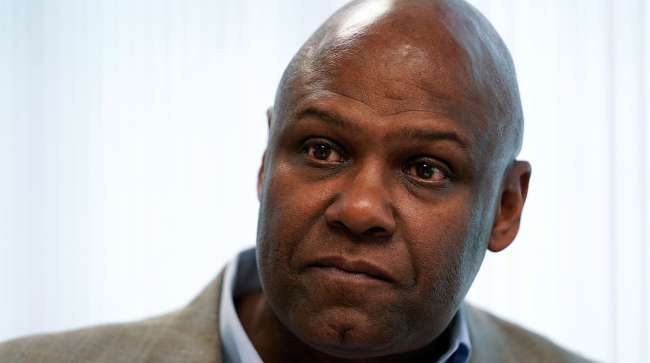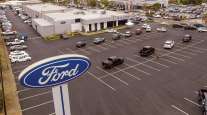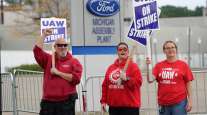UAW Head Ray Curry Says EV Battery Plants Must Be Union

[Stay on top of transportation news: Get TTNews in your inbox.]
SOUTHFIELD, Mich. — If the United Auto Workers union can’t organize workers at new electric vehicle battery factories that will supply Detroit’s three automakers, the union’s future would be in serious doubt.
Ray Curry, president of the 372,000-member UAW, says union representation at the battery plants is critical, given that the major automakers are staking their futures on the widespread adoption of electric vehicles.
“It’s going to be key to lock down that type of new technology,” Curry said in an interview with the Associated Press on the eve of the union’s convention in Detroit this week. “Everybody is dependent upon what happens out of that bargaining.”
UAW Pres Curry, @SecMartyWalsh, UAW VP Dittes & Reg 8 Dir Smith tour the Ultium EV battery plant in Spring Hill, TN a joint venture btw GM / LG Energy Solution. Walsh touted the importance of building the facility union & having a union workforce. We agree! pic.twitter.com/v9ZCzPOYHb — UAW (@UAW) July 12, 2022
General Motors, Ford and Stellantis have announced plans to build seven U.S. factories in joint ventures with battery makers. The plants are expected to employ thousands and to supply power for electric vehicles that the automakers say will account for as much as half their U.S. sales by 2030. EVs now constitute only about 5% of the market.
During the yearslong transition from combustion engines to electricity, Curry said, thousands of workers who now manufacture engines and transmissions will need jobs. He argued that these workers should receive top assembly line wages, now around $32 an hour, without any jobs lost to the technology change.
Any decision on union representation will be part of contract talks with the three automakers that will start next summer.
Sam Abuelsamid, a research analyst at Guidehouse Insights, agreed that as gasoline-powered vehicle sales decline and battery plants become one of the industry’s few employment growth areas, the UAW will need to organize these factories if it is to retain jobs. Fewer workers, he noted, will be required to build electric vehicles, which are much simpler to produce than combustion-engine vehicles.
“They’re going to lose a lot of members, especially from powertrain plants and some other component plants, and also probably from assembly plants,” Abuelsamid said of the union.
Complicating matters is that because the plants are joint ventures between the automakers and battery manufacturers, the two companies may differ on the issue of union representation. GM, which will open the first of the battery plants this summer in Lordstown, Ohio, has said it will support the UAW’s representation.
The issue of EV jobs is so important to the future of the UAW that some industry analysts predict strikes against automakers once contracts expire in September 2023. And because the automakers want costs to be competitive with nonunion battery plants, strikes, if they occur, could run long.
Any decision to strike would be up to the UAW’s members, Curry said. The union, he said, could reach a deal with one automaker “and then the others all line up.”
Curry argued that labor costs make up only a small portion of total battery expenses and that paying union wages would still leave the new factories competitive with nonunion battery plants.
With inflation at a 40-year high, the union will seek to restore cost-of-living pay raises, which were suspended after the 2008-2009 Great Recession battered the auto industry.
Want more news? Listen to today's daily briefing above or go here for more info
“You cannot, during a four-year agreement, not have increased wages and sustain your purchasing power,” Curry said.
When UAW workers at John Deere won cost-of-living raises last year after a monthlong strike, Curry said, it raised interest among workers in the auto and other industries.
The union also is trying to organize workers at factories in the South run by automakers based in other countries. And Curry said it’s looking at electric vehicle startups and is still trying to organize Tesla’s factory in Fremont, Calif.
The UAW, he said, has recruiters at many of the locations, including at Nissan and Volkswagen factories whose workers narrowly rejected union representation in during the past few years. Curry declined to say where the first vote might be.




